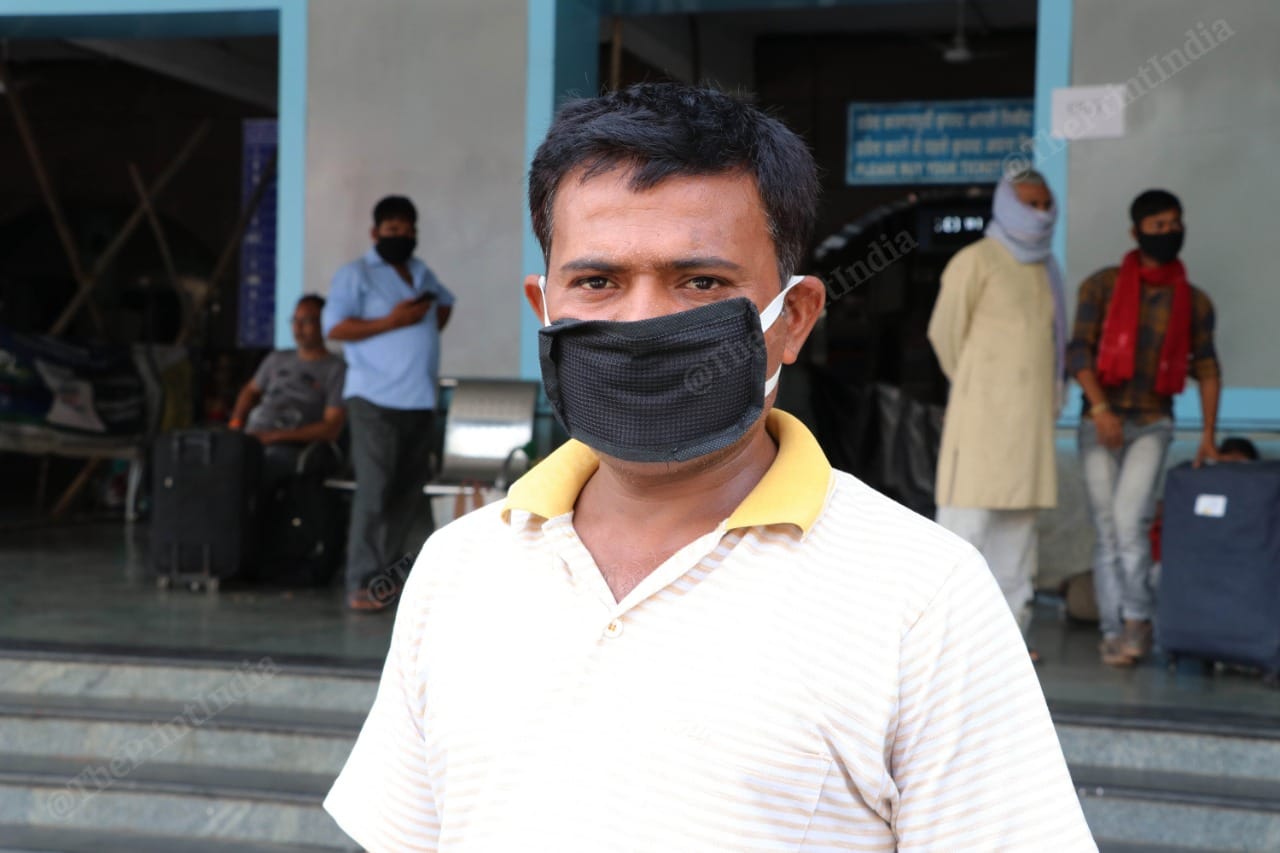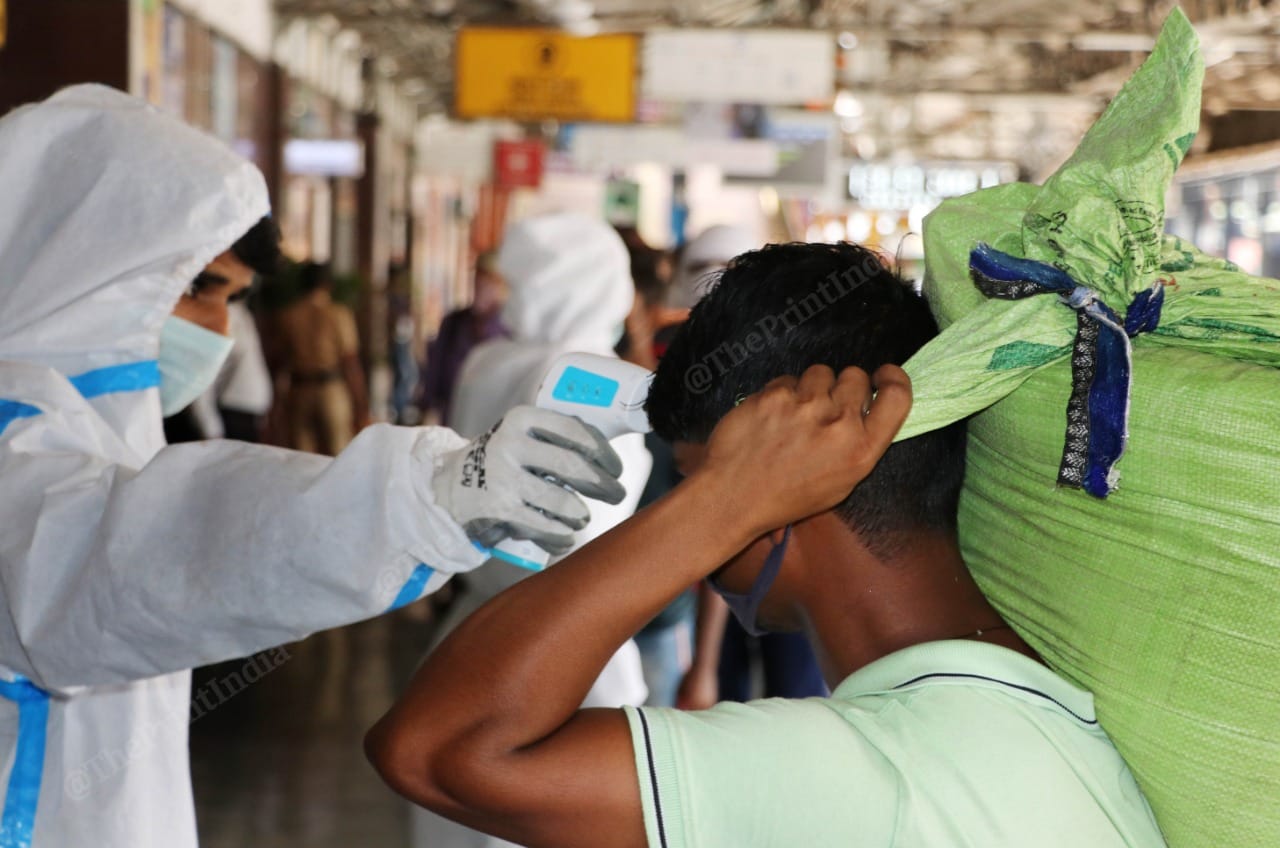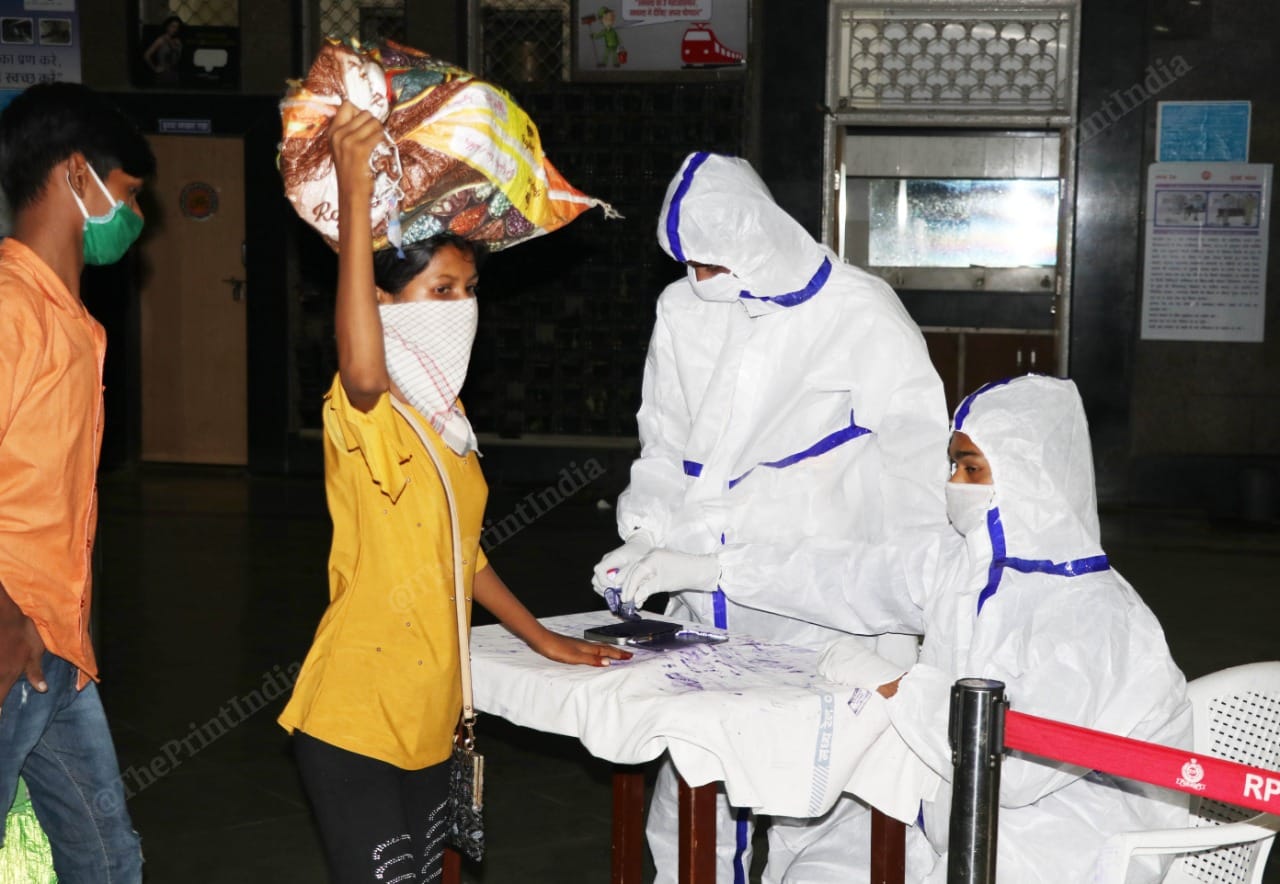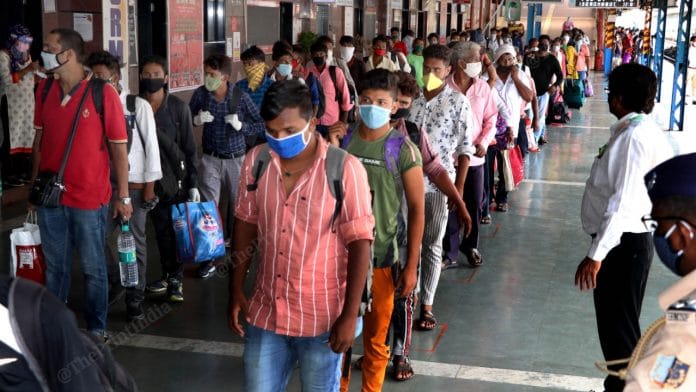Mumbai: Life has come a full circle for Rajnish Kumar (38), a construction worker from Ballia in Uttar Pradesh, who had left Mumbai two months ago, vowing never to return.
Kumar had packed his bags, vacated his room, paid all his dues, and set out on the 1,400 km journey home on foot along with his family — angry and disheartened.
But Wednesday, he once again found himself standing at the same Dadar Railway Station, where he first set foot on almost 10 years ago, dreaming of a better life.
Only now, it is hunger and desperation and not aspiration that has driven him back to the city. And, so far, the tide is yet to turn for Kumar — having returned, he is yet to find work.
“When hunger strikes and there is not a single grain in the house, one has to surrender,” he says. “I had sworn I would never return. I was very angry but it all melts away when your kid sleeps hungry at night.
“I told my contractor I would not return, paid all my dues, left the room I was staying in and went back,” he added. “Now since I am back, I have to restart my life in the city, just like I did 10 years ago.”
Kumar is one of the six lakh migrants and daily wagers from Bihar, Jharkhand, UP, Kerala, Odisha and West Bengal who have returned to Mumbai ever since Unlock 1 began on 1 June.
When lockdown was announced on 24 March, many daily wagers were rendered jobless, with no earnings and no food to eat. At least a million of them left Maharashtra in April and May in packed buses, stacked in trucks and even on foot.
But a combination of fast-depleting savings, lack of jobs at home and debt have forced most of them to return to the city they so angrily left.

‘20,000 migrants returning every day’
According to a senior state government official, at least 15,000 to 20,000 migrants have been returning to Mumbai on a daily basis.
“It all started on 1 June, when 11 trains resumed. According to our records, 15,000 to 20,000 and on busy days 25,000 of them have been returning to Mumbai,” a senior government official, who did not wish to be named said.
“While many of them are coming by trains, many are also coming by road,” he added. “The numbers have crossed 6 lakh in just 30 days and we expect more inflow in the coming days,” he said.
This data is maintained by the social welfare and special assistance department of the state government.
According to the senior government official, while the data of passengers entering Mumbai by trains is maintained by both the Central and Western Railways, separate numbers are compiled by the state transport authority of passengers entering the state by road.
The data shows that until now, over 2 lakh migrants have returned from Azamgarh, Sitara, Ballia, Mirzapur and Jaunpur in UP, over 81,000 from Bihar, 76,000 from Punjab, 55,000 from Rajasthan and 25,000 from West Bengal among other states.
Most migrants who are returning either work as daily wagers in the construction business in Mumbai city or work in factories, industries and plants outside of Mumbai including in Pune and in the districts of Raigad, Nashik, Aurangabad, Thane, Nagpur and Beed.
“These are workers who have been working in Maharashtra for years, so they had to return,” the official quoted above said. “At that time, they were angry, disheartened, but this is the place that gives them livelihood.”

‘Left with no option’
Like many others, Shiv Kumar Yadav too walked some distance and hitched a ride with trucks, tempos and buses to reach Jaunpur in Uttar Pradesh in May, only to return in two months.
“We lived in Mumbai for a few days after the lockdown but after we ran out of money, food to eat, we did not have any option but to leave for home,” he said.
Recalling his stay back home, Shiv said. “I tried to start a small vegetable business there, which did not flourish. Then I was told that the state was making arrangements for our employment. I went to many government offices but did not hear from anyone. I even tried going to adjoining areas in search of some work, but did not get anything.”
While back home, Shiv exhausted whatever money he had saved in all these years of working in Mumbai, and now he is in debt.
“Not only did my savings run out, I had to take credit from my neighbours and friends back in the village to manage a day’s meal,” he said. “I did not have a job, no savings in hand and on top of it the debt. Returning to Mumbai and searching for work was the only way I could think of solving this.”
Shiv then called a few of his friends in Mumbai asking if work had resumed.
Also read: Over 450 new cases daily, but Covid hotspot Thane doesn’t have enough ICU or oxygen beds
Perks for a few
As on 8 June, the Maha Vikas Aghadi government, a coalition of the NCP, Shiv Sena and the Congress, has allowed private construction activity to restart.
Builders who were facing a shortage of workers asked their contractors to call the labourers back by offering them train tickets, enhanced wages, food and medical insurance.
The Mumbai Metropolitan Region Development Authority (MMRDA), too, has started bringing back migrant labourers for a pending metro line project.
“Before the lockdown, we had over 17,000 workers with us but the number went down to 3,000 after they migrated back home. We faced a massive crunch as all of them were skilled labourers,” MMRDA commissioner R.A. Rajeev said.
“Now, they have gradually started returning. While most are being called back by contractors, promising them better money, food and medical facilities, some are returning themselves.”
The MMRDA had carried out a recruitment drive for these workers after most of them left for their homes, but it was not a success.
“The masons, welders, carpenters that you require for our work are not available in Maharashtra,” Rajeev said. “When these people went back home we advertised and recruited some workers, but they did not have the skill set that the previous employees had.
“The contractors are now offering flight tickets, train tickets, trying to woo the workers back and many of them are returning,” he added.
Similarly, Avighna Group, working on building highrises in central Mumbai even arranged flight tickets for 88 workers from West Bengal for their new project in south Mumbai’s Worli area.
“Most of our workers left after the special trains began during the lockdown despite us ensuring that they were given proper food and care,” said Nishant Agrawal, managing director, Avighna Group. “But after they returned to their villages they realised that there was no work or money to even sustain their families and that is when they contacted our contractors to ask if they could return.
“We were more than happy to take them back and so thought of buying them train tickets,” he added. “But I was concerned that if they came on a train, they would be using common toilets and may catch the infection on their journey. That would also put other workers on our site in danger, so we decided to book them flight tickets.”
After the workers returned to Mumbai by flight, they sent their pictures they clicked on the flight back home to their friends, which encouraged them to return too, Aggarwal claimed.
“Most of them boarded a flight for the first time. They narrated their experience to their friends back home and told them that they had been given a clean place to stay and food, and many others started approaching the contractors to make arrangements for them as well,” he added. “So we booked another 28 tickets, and now we have over 88 workers on our site and work has resumed.”
Many real estate developers also believe that 80 per cent of their workforce will soon be back.
Niranjan Hiranandani, president of Assocham and managing director of Hiranandani Group said that in the coming months, 75 to 80 per cent of the workforce will be back.
“They left from here because the work had stopped, they were out of money. But now since the work is slowly resuming and they have no jobs back home, no means of livelihood, they will return,” he said.
“In the last few days, almost 60 to 70 workers who were with us have returned and more will be coming. We are providing them with well sanitised places to work, food, doctor visits twice a week and they are happy working with us,” he said. “It is only a matter of time. When train services become fully functional, most of them will return.”
Is Maharashtra ready?
The returning migrants could place Maharashtra in an even more precarious spot in its Covid-19 fight.
Maharashtra is the worst-affected state in the country, having recorded a total of 2,23,724 cases, with a daily increase of 6,603 cases. The state will now be dealing with the influx of migrants from states across the country, which may lead to a further surge.
Although government officials claimed that the state government has been following guidelines to record details of each migrant entering Maharashtra, by checking their temperature, affixing a seal on their hands for home quarantine and conducting oximetry tests, the reality, however, is different.
At the Dadar Station, where hundreds of passengers deboarded the Varanasi-CSMT special train, none of the passengers were stamped for mandatory home quarantine — a direction issued by the state government for each person arriving in Maharashtra.
At the Chhatrapati Shivaji Maharaj Terminus, however, the stamp for home quarantine was being put.

At neither station did officials take down details of the passengers nor did they conduct oximetry tests.
“Whoever is entering Maharashtra is being duly checked and are being sent to home quarantine. If we find anyone with fever, that person is immediately sent to a hospital or Covid care centre,” the senior official quoted above said.
“It is true that many of them are flouting the quarantine because many of them have to now look for a place to stay, a job so that they can start earning. But we are not allowing anyone to enter without thermal scanning,” he added.
Also read: Stuffed wards, tired doctors: Only Covid hospital in Kalyan-Dombivali near Mumbai crumbles






